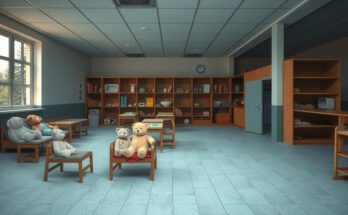Rwandan-backed M23 rebels in the DRC have declared a unilateral ceasefire effective February 4, 2025, to address humanitarian needs amid escalating violence. The announcement follows their seizure of Goma, resulting in hundreds of deaths and displacements. The ceasefire may pave the way for peace talks, coinciding with an upcoming regional summit involving leaders from both the DRC and Rwanda.
The M23 rebel group, supported by Rwandan forces, has announced a unilateral ceasefire in the eastern Democratic Republic of the Congo (DRC) for humanitarian reasons. The ceasefire will begin on February 4, 2025, as stated by the Alliance Fleuve Congo (AFC/M23) in a public statement. This pause in conflict follows their recent capture of Goma, significantly impacting local populations, with reports estimating 900 fatalities and widespread displacement among civilians.
Having successfully taken Goma, the M23 rebels expressed their intention to halt attacks on Bukavu and other provincial cities. Their spokesperson, Lawrence Kanyuka, emphasized the commitment to safeguard civilians while affirming that they have no plans to capture further territory. This announcement aims to address the humanitarian crisis exacerbated by ongoing conflict and to facilitate future peace talks.
The ceasefire coincides with an upcoming regional summit involving leaders from the DRC and Rwanda. Previous attempts at negotiation between DRC President Felix Tshisekedi and Rwandan President Paul Kagame have been unproductive, yet there are indications that they may attend this meeting. The Group of Seven foreign ministers have urged all involved parties to engage in dialogue and ensure the safe passage of humanitarian aid for affected civilians.
The conflict in the DRC is deeply rooted in historical ethnic tensions, particularly concerning the Tutsi population’s plight following the Rwandan genocide in 1994. The DRC government accuses Rwanda and the M23 rebels of resource exploitation, which contributes to the ongoing violence and displacement crisis affecting countless individuals in the region.
The conflict in the Democratic Republic of the Congo (DRC) has a complex history, stemming from ethnic rivalries and political instability. In recent years, the M23 rebel group has gained attention for its military actions, significantly impacting the region’s stability, including the seizure of key cities like Goma. This tension has led to humanitarian crises, with numerous civilians affected by violence and displacement. The involvement of neighboring Rwanda complicates the situation, increasing the urgency for diplomatic resolutions and humanitarian support.
The M23 rebels’ declaration of a ceasefire represents a critical moment amidst ongoing conflict in the DRC. While this pause aims to alleviate humanitarian suffering, it is interlinked with broader regional dynamics and unresolved ethnic tensions. Continued dialogue and negotiation between regional leaders are essential to foster lasting peace and address the needs of displaced populations. The international community’s engagement will play a vital role in ensuring safe humanitarian access and facilitating future peace talks.
Original Source: www.aljazeera.com




